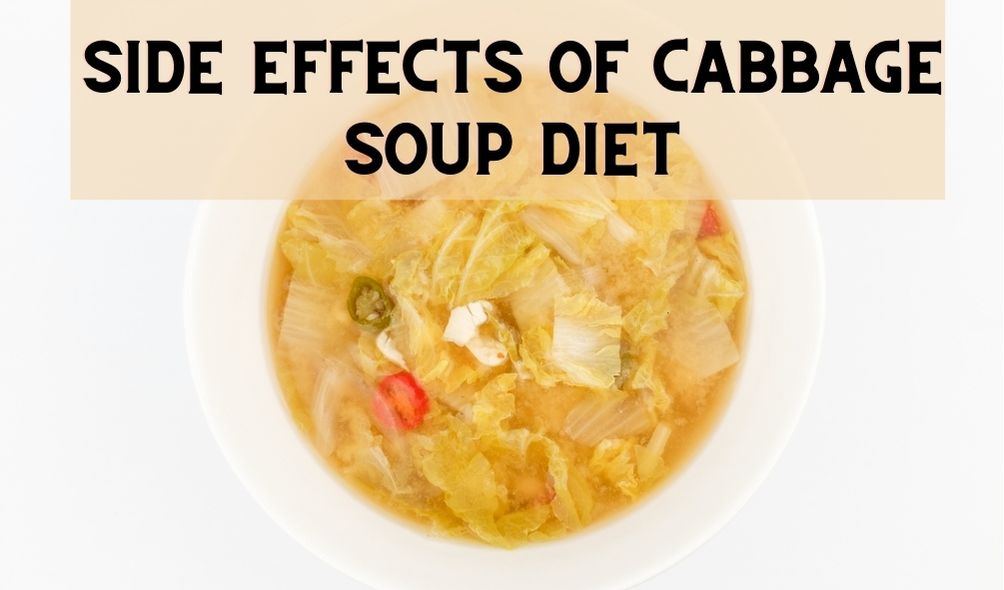The Cabbage Soup Diet is a low-carb diet that encourages rapid weight loss. The Cabbage Soup Diet comes in numerous forms, but they all follow the same fundamental principle: eat as much cabbage soup as you like. The soup is often made with onions, bell peppers, tomatoes, celery, cabbage, bouillon cubes, salt, pepper, and other ingredients. According to the American Heart Association, the Cabbage Soup Diet is ineffective and has several harmful side effects.
Check out the Cabbage Soup diet plan, results, and shopping list.
Side Effects of Cabbage Soup Diet
The cabbage soup diet’s effectiveness for healthy weight reduction is not supported by scientific research.
Although it may result in temporary weight reduction, most people soon recover that weight once the diet is discontinued.
The cabbage soup diet was a diet craze that swept the world in the 1980s. It entails eating just cabbage soup for a week.
Diet supporters claim that those who follow it strictly can lose up to 10 pounds in a week.
Crash diets, such as the cabbage soup diet, might result in temporary weight reduction. Most people, however, regain the weight once they stop.
Unfortunately, there are some side effects that you may experience if you are following a cabbage soup diet. These side effects include:
Bloating, gas, and abdominal pain
When ingested in large quantities, cabbage, like other cruciferous vegetables, is known to produce gas, bloating, and stomach discomfort. Even small quantities of cabbage might cause these symptoms in people who are prone to gas.
As a result, it’s no wonder that the Cabbage Soup Diet frequently causes gas, bloating, and stomach pain. The intensity and frequency of symptoms vary depending on how much cabbage soup you drink and your susceptibility to gas-causing chemicals in cabbage. However, the more cabbage soup you eat throughout the diet, the more likely you have these symptoms.
How long does it take to debloat after a binge? check out.
Fatigue, Hunger, and Exhaustion
The Cabbage Soup Diet promotes severe calorie restriction and contains no fat or protein. According to nutritionists, the diet is based on low-calorie and negative-calorie meals — foods that your body requires more calories to digest than the foods contain.
According to Danbrot, even little changes to the Cabbage Soup Diet, such as swapping fruit for a vegetable, might provide small amounts of calories that may make a difference in weight reduction. This concentration on taking as few calories as possible while seeking to alleviate hunger by eating soup is neither scientifically nor nutritionally true, but it is possibly harmful.
You may sense acute hunger and exhaustion if you do not consume enough calories for fuel, and you may feel less able to attend to your typical job, school, and home responsibilities. Fat and protein provide a variety of advantages, including increased energy, satiation, and dietary satisfaction. Fat is also required for the absorption of certain nutrients, while protein helps to build muscle. Without fat and protein, you are more likely to experience weariness, hunger, and fatigue.
Problems with the Heart and Electrolytes
One of the risks of extremely low-calorie diets, such as the Cabbage Soup Diet, is cardiovascular disease. Consuming fewer than 800 calories per day is related with abnormal cardiac rhythms, which can be deadly, according to the Weight-control Information Network. If you have a history of heart disease, an irregular heartbeat is more risky. Low-calorie diets frequently lack hydrating nutrients, such as enough portions of fruits and vegetables.
Dehydration
Furthermore, eating soup throughout the day may lessen your desire to drink water. As a result of these factors, the Cabbage Soup Diet may result in dehydration.
Dehydration can induce various symptoms, including fatigue, weakness, and dizziness. Dehydration, if left untreated, can result in electrolyte imbalances, which are abnormal amounts of physiological salts that assist in regulating your heartbeat, muscular contraction, and other vital activities. Electrolyte abnormalities can result in fainting, difficulty breathing, and death in extreme situations.
Emotional Impact
The Cabbage Soup Diet may also hurt your mental well-being. Deprivation might result from a restriction on usual meals and snacks. Dieting is related to low self-esteem and body image, anxiety, sadness, and an increased risk of mental diseases such as anorexia, bulimia, and binge eating disorder, according to the National Eating Disorders Association.
Reduce metabolism
There is no proof that the Cabbage Soup Diet works. In reality, most dieters are dissatisfied when their lost weight returns fast once they resume eating normal meals. Restrictive diets might also lower your metabolism and contribute to weight gain in the future. Most diets, according to the National Eating Disorders Association, do not result in long-term weight loss success. Dieting also raises your chances of establishing binge-eating habits, which can lead to weight gain.
Does metabolic confusion work better than diets? Check out.
What to eat after cabbage soup diet
The cabbage soup diet comes in a variety of flavors and ways to prepare.
Most cabbage soup diet variations entail eating white cabbage soup for a week while gradually integrating other low-calorie meals, such as raw fruits and vegetables, into the diet during the week.
In addition to cabbage, some individuals prepare soup using additional low-calorie vegetables such as bell peppers, spinach, and other leafy greens.
mushrooms, broccoli, cauliflower, or zucchini.
Because cabbage soup is low in calories, there is no limit to the quantity a person may eat while being on this diet. Most individuals will want at least two bowls every day for the whole week to prevent feeling hungry.
People on the cabbage soup diet can consume as much cabbage soup as they desire, as well as unsweetened, low-calorie beverages like herbal tea and black coffee.
After cabbage soup diet, it’s better to stick to low-calorie and low-carb foods to avoid gaining the weight you lost. Check out How to Lose Appetite Completely With or Without Eating.
